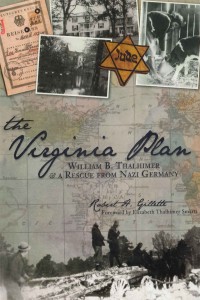Gillette ’59 Writes about Angress ’49 in Virginia Plan

Two Wesleyan alumni, separated by a decade, crossed paths recently in a most unusual way.
Robert Gillette ’59 was riveted by the snippet of conversation his daughter-in-law overheard and recounted. It had been between a guest at the Hyde Farmlands Bed and Breakfast in Burkeville, Va., and a young waitress:
“What are those log buildings all in a row in the back yard?” asked the guest.
“Those are the Jew huts. There were these people called Jews who lived there,” the waitress replied.
As Gillette writes in the introduction to The Virginia Plan: William B. Thalhimer and a Rescue From Nazi Germany (The History Press, 2011) his reaction was immediate. “’Jew huts’ on a Virginia farm? ‘People called Jews’?’”
“Four years later,” he writes, “I now know what that waitress was talking about…. The story is a veritable saga that began in the tumultuous years of the 1930s. It is the true story of the rescue of 21 Jewish adolescents from Nazi Germany through the efforts spearheaded by William B. Thalhimer of Richmond, Va. My questions, like incessant mayflies swarming on a Virginia field, multiplied. Who were these adolescents? What were their lives like in Germany during the rise of Hitler? How did they escape? … And above all, who was this William Thalhimer, and what drove him to help the refugees?”
Gillette answers all those questions and more in this well-crafted, thoroughly researched history of an almost unknown aspect of World War II history: Virginia department store owner William Thalhimer and German social psychologist Dr. Curt Bondy, through steadfast and determined efforts, provided refuge for a number of young Jewish students living in Nazi Germany. The students, trained in agricultural science at the Gross Breesen school, headed by Bondy, studied and worked with hope that these new skills would allow them to be granted visas. In America, Thalhimer prepared their future community, collaborating with Bondy despite the ocean and cultures between them.
It was during his painstaking research that Gillette made a personally heartwarming discovery: one of these students was Werner “Tom” Angress ’49, a fellow Wesleyan alumnus, who plays an enormous role in the book. Angress, who lived for several years at Hyde Farms, then served in the U.S. Army in Europe. His letters to Bondy detailed burying the dead prisoners who had been held in a concentration camp near his hometown. Angress returned to the United States and, on the G.I. Bill, attended Wesleyan, graduating Phi Beta Kappa and becoming a history professor and writer. His daughter, Nadine, also attended Wesleyan, graduating in 1990
Sadly, Angress died not long before Gillette’s book was finished. “I wish he could have read it before he died,” said Gillette. “He was very proud of his Wesleyan days and we chatted about some of the professors we had experienced and admired
“They never forgot Curt Bondy’s influence and lifelong dedication to their welfare,” writes Gillette of the Gross Breeseners, in conclusion. “They never forgot those who gave their lives for their safety and rescue. They never forgot how William B. Thalhimer fought for their immigration and saved their lives by bringing them to Hyde Farmlands in Burkeville, Va.”
Gillette notes that the book continues to receive attention. The Virginia Plan has been nominated for the 15th Annual Library of Virginia Literary Awards in the non-fiction category. It has been selected for the Festival of the Book (Virginia Humanities Commission) held at the University of Virginia in March, as well as for Lynchburg Reads 2012. Additionally, the Museum of Jewish Heritage in New York will feature the story and the book in their exhibit this year that will deal with “Americans Who Saved.”
Gillette’s study of this era continues. He is currently reading Nazi Conquest through German Culture, written by Ralph F. Bischoff ’29, and published by Harvard University Press in 1942. “This publication was made possible by a grant from Wesleyan University Research Funds,” Bischoff wrote in his preface. At the time of Angress’s application to Wesleyan, Bischoff was assistant professor of government and dean of admissions. “One can only imagine the content of the conversation between Tom Angress and Bischoff during the admission interview,” says Gillette. “Bischoff spoke German and had done research in Germany as late as 1938.”

